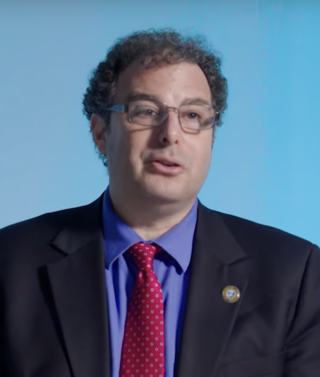Related Research Articles
Michael Irwin Jordan is an American scientist, professor at the University of California, Berkeley, research scientist at the Inria Paris, and researcher in machine learning, statistics, and artificial intelligence.
Ekaterini Panagiotou Sycara is a Greek computer scientist. She is an Edward Fredkin Research Professor of Robotics in the Robotics Institute, School of Computer Science at Carnegie Mellon University internationally known for her research in artificial intelligence, particularly in the fields of negotiation, autonomous agents and multi-agent systems. She directs the Advanced Agent-Robotics Technology Lab at Robotics Institute, Carnegie Mellon University. She also serves as academic advisor for PhD students at both Robotics Institute and Tepper School of Business.

Michael Lederman Littman is a computer scientist, researcher, educator, and author. His research interests focus on reinforcement learning. He is currently a University Professor of Computer Science at Brown University, where he has taught since 2012.

Ayanna MacCalla Howard is an American roboticist, entrepreneur and educator currently serving as the dean of the College of Engineering at Ohio State University. Assuming the post in March 2021, Howard became the first woman to lead the Ohio State College of Engineering.

Manuela Maria Veloso is the Head of J.P. Morgan AI Research & Herbert A. Simon University Professor Emeritus in the School of Computer Science at Carnegie Mellon University, where she was previously Head of the Machine Learning Department. She served as president of Association for the Advancement of Artificial Intelligence (AAAI) until 2014, and the co-founder and a Past President of the RoboCup Federation. She is a fellow of AAAI, Institute of Electrical and Electronics Engineers (IEEE), American Association for the Advancement of Science (AAAS), and Association for Computing Machinery (ACM). She is an international expert in artificial intelligence and robotics.
Dinesh Manocha is an Indian-American computer scientist and the Paul Chrisman Iribe Professor of Computer Science at University of Maryland College Park, formerly at University of North Carolina at Chapel Hill. His research interests are in scientific computation, robotics, self-driving cars, affective computing, virtual and augmented reality and 3D computer graphics.

Sarit Kraus is a professor of computer science at the Bar-Ilan University in Israel. She was named the 2020-2021 ACM Athena Lecturer in recognition of her contributions to artificial intelligence, notably to multiagent systems, human-agent interaction, autonomous agents and non-monotonic reasoning, as well as her leadership in these fields.
Lydia E. Kavraki is a Greek-American computer scientist, the Noah Harding Professor of Computer Science, a professor of bioengineering, electrical and computer engineering, and mechanical engineering at Rice University. She is also the director of the Ken Kennedy Institute at Rice University. She is known for her work on robotics/AI and bioinformatics/computational biology and in particular for the probabilistic roadmap method for robot motion planning and biomolecular configuration analysis.

Lise Getoor is an American computer scientist who is a distinguished professor and Baskin Endowed chair in the Computer Science and Engineering department, at the University of California, Santa Cruz, and an adjunct professor in the Computer Science Department at the University of Maryland, College Park. Her primary research interests are in machine learning and reasoning with uncertainty, applied to graphs and structured data. She also works in data integration, social network analysis and visual analytics. She has edited a book on Statistical relational learning that is a main reference in this domain. She has published many highly cited papers in academic journals and conference proceedings. She has also served as action editor for the Machine Learning Journal, JAIR associate editor, and TKDD associate editor.
Nancy Marie Amato is an American computer scientist noted for her research on the algorithmic foundations of motion planning, computational biology, computational geometry and parallel computing. Amato is the Abel Bliss Professor of Engineering and Head of the Department of Computer Science at the University of Illinois at Urbana-Champaign. Amato is noted for her leadership in broadening participation in computing, and is currently a member of the steering committee of CRA-WP, of which she has been a member of the board since 2000.

Barbara J. Grosz CorrFRSE is an American computer scientist and Higgins Professor of Natural Sciences at Harvard University. She has made seminal contributions to the fields of natural language processing and multi-agent systems. With Alison Simmons, she is co-founder of the Embedded EthiCS programme at Harvard, which embeds ethics lessons into computer science courses.

Nicholas Robert Jennings is a British computer scientist who was appointed Vice-Chancellor and President of Loughborough University in 2021. He was previously the Vice-Provost for Research and Enterprise at Imperial College London, the UK's first Regius Professor of Computer Science, and the inaugural Chief Scientific Adviser to the UK Government on National Security. His research covers the areas of AI, autonomous systems, agent-based computing and cybersecurity.
Henry A. Kautz is a computer scientist, Founding Director of Institute for Data Science and Professor at University of Rochester. He is interested in knowledge representation, artificial intelligence, data science and pervasive computing.

Peter Stone is an American computer scientist who holds the Truchard Foundation Chair of Computer Science at The University of Texas at Austin. He is also Chief Scientist of Sony AI, an Alfred P. Sloan Research Fellow, Guggenheim Fellow, AAAI Fellow, IEEE Fellow, AAAS Fellow, ACM Fellow, and Fulbright Scholar.
Maria Gini is an Italian and American Computer Scientist in artificial intelligence and robotics. She has considerable service to the computer science artificial intelligence community and for broadening participation in computing. She was Chair of the ACM Special Interest Group in Artificial Intelligence SIGAI from 2003 to 2010. She is currently a member of the CRA-W board.

ACM SIGAI is the Association for Computing Machinery's Special Interest Group on Artificial Intelligence (AI), an interdisciplinary group of academic and industrial researchers, practitioners, software developers, end users, and students who work together to promote and support the growth and application of AI principles and techniques throughout computing. SIGAI is one of the oldest special interest groups in the ACM. SIGAI, previously called SIGART, started in 1966, publishing the SIGART Newsletter that later became the SIGART Bulletin and Intelligence Magazine.
Franco Zambonelli is a full professor in Computer Science at the University of Modena and Reggio Emilia, Italy, since 2010.

Marie desJardins is an American computer scientist, known for her research on artificial intelligence and computer science education. She is also active in broadening participation in computing.
Jiebo Luo is a Chinese-American computer scientist, the Albert Arendt Hopeman Professor of Engineering and Professor of Computer Science at the University of Rochester. He is interested in artificial intelligence, data science and computer vision.
References
- ↑ "Singh named SAS Institute Distinguished Professor of Computer Science".
- ↑ "NC Computer Science: Full Professors Directory".
- ↑ "NC State Computer Science: Munindar P. Singh".
- ↑ "Munindar Singh's homepage" . Retrieved 24 April 2013.
- ↑ "IEEE - Fellow Class of 2009". Institute of Electrical and Electronics Engineers (IEEE). Archived from the original on 3 August 2012.
- ↑ "Elected AAAI Fellows".
- ↑ "AAAS Announces Leading Scientists Elected as 2020 Fellows | American Association for the Advancement of Science". www.aaas.org. Retrieved 25 November 2020.
- ↑ "Munindar P. Singh". awards.acm.org. Retrieved 5 February 2022.
- ↑ Munindar Paul Singh at the Mathematics Genealogy Project
- ↑ "Social and Psychological Commitments in Multiagent Systems" (PDF). Retrieved 24 April 2013.
- ↑ "Agent Communication Languages: Rethinking the Principles" (PDF). Retrieved 24 April 2013.
- ↑ "IFAAMAS 2016 Influential Paper Award" . Retrieved 7 June 2016.
- ↑ "Flexible Protocol Specification and Execution: Applying Event Calculus Planning using Commitments" (PDF). Archived from the original (PDF) on 18 April 2003. Retrieved 24 April 2013.
- ↑ "Information-Driven Interaction-Oriented Programming: BSPL, the Blindingly Simple Protocol Language" (PDF). Archived from the original (PDF) on 27 September 2011. Retrieved 24 April 2013.